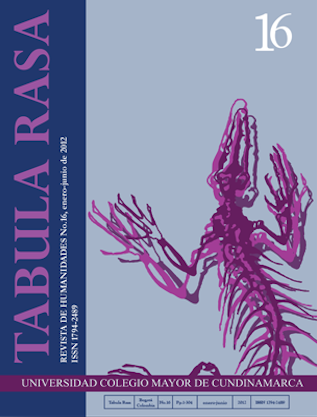Implosions: borderline corporalities as practices of freedom, or how to dilute a true regime and produce another one in your own body without dying in the attempt
Implosiones: corporalidades fronterizas como prácticas de libertad o cómo diluir un régimen de verdad y producir otro en el propio cuerpo, sin morir en el intento
Show authors biography
This paper presents on one hand a dense description of capoeira angola technique, intending to show the effects its practice generates in the construction of corporality and thereby in the lived world, and on the other hand, it presents a series of reflections aiming to open the possibility to broaden Foucault’s notion of ‘practices of freedom’, starting from a decolonial micropolitical approach, which refers to the embodied agenciality that can be observed in this sort of spiritual wisdom, so present and living all over Latin America.
Article visits 91 | PDF visits 59
Downloads
Deleuze, G. y F. Guattari. 2000. Mil mesetas, Capitalismo y esquizofrenia. Barcelona: PreTextos.
Downey, Greg. 2005. Learning Capoeira. Lessons in Cunning from an Afro-Brazilian Art. Nueva York: Oxford University Press.
Dumoulié, Camille. 2010. «Capoeira, a philosophy of the body». En: Revue Silène. Recuperado en: 05/09/10, de http://www.revue-silene.com/f/index.php?sp=liv&livre_ id=145.
Fanon, Frantz. 2009. Piel negra, máscaras blancas. Barcelona: Akal.
Foucault, Michel. 2009. El gobierno de sí y de los otros. Buenos Aires: Fondo de Cultura Económica.
Foucault, Michel. 2006. La hermeneútica del sujeto. Buenos Aires: Fondo de Cultura Económica.
Foucault, Michel. 2003. El yo minimalista y otras conversaciones. Buenos Aires: La Marca.
Foucault, Michel. 1988. «Technologies of the self». En: Luther Martin et al. 1988. Technologies of the Self: A Seminar with Michel Foucault. Londres, Tavistock. pp.16-49. [versión electrónica] Recuperado en: 15/11/11, de http://foucault.info/documents/foucault. technologiesOfSelf.en.html
Foucault, Michel. 1983. The culture of the self. Conferencia Universidad de California, Berkeley. Recuperado en 03/12/11, de http://www.youtube.com/watch?v=CaXb8c6jw0k.
Maldonado-Torres, Nelson. 2007. «Sobre la colonialidad del ser: contribuciones al desarrollo de un concepto». En: Santiago Castro-Gómez y Ramón Grosfoguel. El giro decolonial. Reflexiones para una diversidad epistémico más allá del capitalismo global. Universidad Central —IESCO— Pontificia Universidad Javeriana-Instituto Pensar, Siglo del Hombre Editores.
Mestre Janja, 2003. «Instituto Nzinga de Estudos da Capoeira Angola e de Tradições Educativas Banto no Brasil». Entrevista realizada en marzo de 2003 Revista Inventando Pólvora. No 1. Recuperado en: 24/01/12, de http://www.inventandopolvora.org/ CMJres_cast.html
Pamfilio de Sousa, Ricardo. 2007. «La música en la capoeira angola de Bahía». En: Textos de Brasil No 14. Ministerio de Relaciones Exteriores. Bogotá.
Rose, Nikolas. 1999. Governing the soul. The shaping of the private self. Londres-Nueva York: Free Association Books.
Torres, William. 1998. Correspondencia personal. Archivo personal.
Varela, Francisco. 2000. El fenómeno de la vida. Santiago de Chile: Dolmen.
Watsuji, Tetsuro. 2006. Antropología del paisaje. Climas, culturas, religiones. Salamanca: Ediciones Sígueme.




